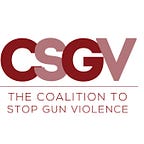What I learned in Parkland
Nearly two months after the shooting at Marjory Stoneman Douglas High School, I, along with two other Coalition to Stop Gun Violence employees, flew to Parkland, Florida. In the weeks following the shooting, we had been in contact with a few MSD students and discussed the idea of meeting with them face-to-face. When we decided to visit, the discussion that arose from Parkland had already changed the world. But where would it go from here? The focus of our trip wasn’t the Coalition to Stop Gun Violence or the movement itself, but rather it was a way to say thank you and learn more.
Our hotel — located about a mile from Marjory Stoneman Douglas High School — was used as an emergency triage center only seven weeks earlier. It was at this hotel where 17 families learned that their loved ones were not coming home. There were a few signs of what occurred there — an advertisement for grief counseling near the check-in desk, some ribbons on the uniforms of some hotel employees, a memorial issue of the local “going out” guide.
A few hours after we arrived, the reality of American gun violence hit us once again. Breaking news of a shooting at the Youtube headquarters in California had begun to flash across the television screens. As I scrolled through Twitter to find details, it was clear that the news had already taken a toll on many of the MSD students.
The impact of the MSD shooting could be seen and felt throughout Parkland. Everywhere we went, we saw people wearing supportive shirts or pins. The restaurant where we ate dinner was selling wristbands that benefited victim’s funds. Everyone had been touched by this. When their children, friends, and neighbors were attacked — they were all attacked. And now this community was rallying around the message resonating from this school.
Congressman Ted Deutch’s staff had invited us to a town hall that he was holding on gun violence prevention. On the drive to the town hall, we passed the MSD campus. A chain fence had been constructed around the building where the shooting took place, adorned by signs from other high schools and local businesses offering their condolences. The building and parking lot looked hollow, the scene of 17 murders and countless attempts on innocent lives. The grief was palpable.
The venue was full. Many in the audience were wearing #MSDstrong shirts to show their support. A community still very much in search of answers was eager to participate in this discussion. When the MSD students — many of them now recognizable around the world — took their seats in the front row, the crowd gave them a standing ovation.
Following the opening remarks, Rep. Deutch invited Fred Guttenberg onto the stage to say a few words. Fred — whose daughter Jaime was killed on February 14th — made clear that he and his family were having a difficult time and that changing the law and changing the debate around guns in this country was what kept him going. He thanked the community — especially the student body — for everything that they had done. Through unspeakable grief, he was optimistic of the change that was happening. And the crowd was right there with him.
When it came to questions from the audience, students were rightfully given preference. In recent days, Marjory Stoneman Douglas High School was guarded with a heavy police presence and students were required to carry clear backpacks and ID badges. No visitors were allowed on campus and many students were left feeling like prisoners. They were given mixed messages: being told to return to normal while simultaneously hearing that it is okay to not be okay. One student, a freshman, summed it up perfectly in her question:
“We have end of year testing coming up. You are telling us that we shouldn’t be over this, but how am I supposed to focus on math?”
It was a heavy moment.
These young students had been forced to grow up so quickly. They had lost best friends, their teachers, their coaches. Their focus should be on tests and prom and finding a summer job, not fighting for their right to live. As one student later told us, “I just wish I could go back to caring about stupid stuff.” They should be allowed to be kids. That is impossible now. Instead, they are using their voices to change the entire world.
The cameras are going away, the march has ended. But the wounds are still very real. Before leaving Parkland, we stopped one more time near MSD. We took a few moments to pay our respects. The Florida sun rays were peeking out just above the signs displaying the words Marjory Stoneman Douglas High School. Dead grass existed where makeshift memorials had previously been displayed. Standing there, I felt hopeful. This would be a place long remembered. Like Little Rock Central High School or the Stonewall Inn, it will become a symbol for a much broader movement. Not for the tragedy and sadness that occurred but the people and voices that came out of that tragedy and sparked a movement for social change.
This is long overdue. It shouldn’t have taken this long. We should have had change after Columbine, after Virginia Tech, after Sandy Hook. We should have had change in response to the day-to-day gun violence that plagues our inner cities and has long been ignored by the media and the public. We should have had change because 38,000 annual gun deaths is far too many — suicides, domestic homicides, and other deaths that have just become statistics. The moment is now. The students of Marjory Stoneman Douglas High School and the Parkland community are leading the way. We must not let them down.
Andrew Patrick is the Media Director for the Coalition to Stop Gun Violence
